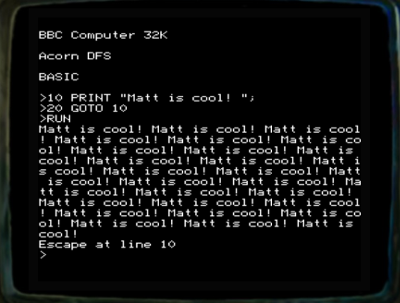Emulating a BBC Micro in Javascript - Part Two
Following on from my previous post, I’m going to talk a bit about emulating the video hardware of a BBC Micro. Firstly, a big credit to Tom Walker for his b-em emulator upon which much of the jsbeeb video code is based. Thanks Tom!
The video hardware
When most people think of a BBC Micro, they think of the iconic “Teletext” display, referred to as MODE 7. It was the default screen mode and had some great benefits: it had high-resolution, clear text, many colours, and some cool effects. The fact it only took up 1KB of memory was nice too, especially when that may be 1/16th of your whole RAM.
